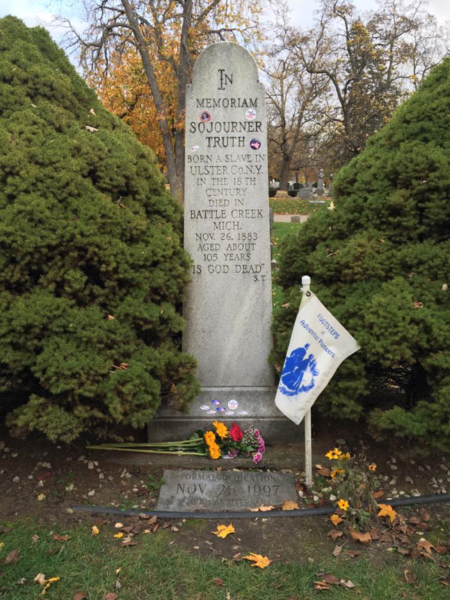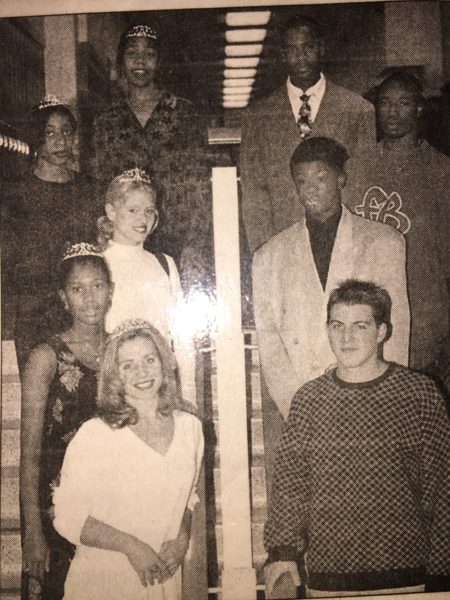I grew up in a small industrial town in the heart of the rustbelt. Home of cereal giants Kellogg and Post, I woke up every morning to the smell of cereal baking. Over time, I learned to detect the distinct scents between the cereals permeating the air. Cornflakes became my iconic favorite and are deeply nostalgi c for me. Sometimes when I miss my family I buy a box of cornflakes.
c for me. Sometimes when I miss my family I buy a box of cornflakes.
Battle Creek was a diverse city for its size. I grew up on the stories of the freed slaves, abolitionists, and Quakers who settled in Battle Creek and turned the city into a major stop on the underground railroad. We heard the stories of Sojourner Truth who is buried in the same cemetery as the Kellogg and Post families and who was a fierce abolitionist and suffragist. On Tuesday, my sister placed flowers on her grave for the women of our family in remembrance and gratitude. On the same day, we wondered if we might see the US Presidency transition from our first black president to our first female president. What would Sojourner think of that?
In Battle Creek we grew up scrappy. I was the kid of a school teacher and a social worker and we were considered rich because my parents owned stemware. And until I arrived at my private Jesuit college, I believed it was true because there were few people around to show me otherwise.
 At our breakfast tables, we learned about layoffs and plant closures. People’s parents losing their jobs. On our playgrounds we worked out racial tensions the way kids do. We did each other’s hair, we teased each other, we compared our families’ obsessions with mayonnaise or hot sauce and turned our noses up at each other’s food. We co-conspired against our playground monitors and made fun of our teachers. While our differences always remained, the distance between felt small in those moments.
At our breakfast tables, we learned about layoffs and plant closures. People’s parents losing their jobs. On our playgrounds we worked out racial tensions the way kids do. We did each other’s hair, we teased each other, we compared our families’ obsessions with mayonnaise or hot sauce and turned our noses up at each other’s food. We co-conspired against our playground monitors and made fun of our teachers. While our differences always remained, the distance between felt small in those moments.
I grew up in the height of the crack epidemic. Where we lost jobs we gained cocaine. Our city began to suffer. Not unlike our fallen giant to the east, Detroit. But smaller and more intimate. We knew whose parents were addicted. We knew who started selling. We knew classmates who were killed. Many of us “got out” of Cereal City after high school. We left our hometown for college and headed to cities that had jobs to offer us like Atlanta, Chicago, New York, and LA.
The last time I went back to my hometown, most of the businesses had closed. The city was a ghost town of  infrastructure. My elementary school had closed. My junior high, named after W.K. Kellogg, closed as well. Battle Creek is a city that might have frighten me now as a (more) affluent adult witnessing the signs of extreme poverty. But I know every corner of the city. I remember each one of the strings of businesses that budded, then failed, before a development was laid to waste. Before the windows were blown out of the stores on Capital avenue, I remember the ice cream shop we rode our bikes to and the pizza place we hated but would eat anyway, because it was pizza. I loved this city before confederate flags began to appear.
infrastructure. My elementary school had closed. My junior high, named after W.K. Kellogg, closed as well. Battle Creek is a city that might have frighten me now as a (more) affluent adult witnessing the signs of extreme poverty. But I know every corner of the city. I remember each one of the strings of businesses that budded, then failed, before a development was laid to waste. Before the windows were blown out of the stores on Capital avenue, I remember the ice cream shop we rode our bikes to and the pizza place we hated but would eat anyway, because it was pizza. I loved this city before confederate flags began to appear.
I sat in Detroit on Tuesday night, excited to be back in the heart of the rust belt for this election. Memories of walking around the city with my dad, a fierce advocate of the poor and a devoted urban planner, rushed back to me as political discussion swirled around failed labor and trade policies. But at that moment I was also optimistic. It’s true that factories left crushed communities that loved them and depended on them in their wake. At the same time, I could see that Detroit is in the midst of a resurgence. Companies like Shinola aim to reimagine American industrialism and communities are beginning to rebuild, dotted with urban agriculture that is reclaiming the city’s blight.
I saw this as a symbol of hope.
On Tuesday night, I expected to learn one lesson about our country in Detroit. But instead I learned another.
If statisticians worshiped idols, Nate Silver would be among them. In fact, there is a past presentation of mine with his face surrounded by a big, girlie heart. We love him. On Tuesday night, I sat in a bar in Detroit, toggling between FiveThirtyEight’s website, a proposal I had to finish, and looking up at CNN’s unfolding election.
Excited to see a woman elected president, I held tight to Nate’s predictions until Ohio and Pennsylvania went red. And then I realized our idols had fallen. The polls had failed, our numbers were wrong, and Michigan’s rust belt sister to the east and brothers to the south went red. I then tried to reconcile, state-by-state, how our numbers got it so wrong—something data scientists are still busying themselves with, even days after.
I am a huge believer in the messy, messy behaviors of people. I have spent my entire life crossing divides – race, class, borders, you name it. I am comfortable in the uncomfortable spaces because that’s where we find our humanity, our strengths, and our vulnerabilities. I love to listen to stories. I love to find the gaps between our best intentions and our worst behaviors. I want to understand what drives people, what motivates them. I always push pairing our predictive models and our surveys with qualitative data because I know that no single piece of information is complete. We need to measure and calculate. But we also need to relate, to feel, to listen, to observe, and to empathize.
But I didn’t do that this time. So threatened by the tone of the election, I didn’t listen to my ghost town or take seriously the confederate flag. I didn’t listen to the shattered windows and the fallen giants. I avoided the hard conversations with my extended family who do not hold my view of the world and who have grown increasingly angry over the years. I did not take the time to listen. Because I dismissed their support of our president-elect, I failed to listen to half of the country when they were trying to tell me that they felt abandoned.
I am an optimist. And, I know we are going to enter a trying moment in America’s story. We are going to have to contend with polarized world views, some dangerous. Each side feels, firmly, that the other’s success is as the cost of their own. And in the case of people targeted by hate speech, this is more than a feeling – it is a reality. If we are not careful, we are going to fuel the vitriol that characterized this election. Or, we are going to have to listen carefully to what this moment is telling us. Like any good researcher.
